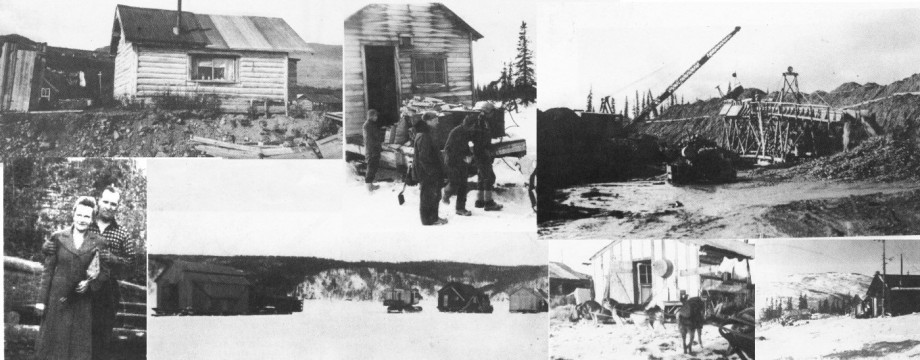Going Home
About half way between Flat and McGrath we met a nice new red plane. Matt said it was Frank Dorbandt. When we stopped in McGrath, Dorbandt came with Oscar and others, fueled up and took off. Oscar beat me to Anchorage.
We met Aina and Gus in Seward on their way home. We boarded the steamship Alaska on which they had come and headed for Seattle that evening. It was dark when we entered the Gulf of Alaska, where a fierce storm was raging. I became sea sick. Oscar had no problems and was no help to me, for he kept going out and coming back, saying in Finnish, “My gosh, this is s terrible storm–the worst I have ever seen.” It was a great relief when in the morning we got out of the Gulf and into the Inside Passage.
Aunt Bertha had her brother-in-law build a house in Palo Alto, California, during the summer of 1930, and she and her daughter, Gertrude, moved there.
I stayed at Oscar’s a few days, then boarded a Greyhound for Detroit, where I looked around for s used car. They were plentiful. Because of the depression, people out of work were forced to sell their cars for money to live on. I settled on a fancy used 1931 Hudson Super-Six sport coupe, a two-tone red, with lots of nickel plate, and a spare wire wheel and tire mounted in s fender well in both front fenders. The salesman said four hundred fifty dollars, but sold it to me for three hundred seventy five.
I kept the Hudson for about four months, then traded it in for a down payment on two new Ford dump trucks. I got work in Trumansburg, New York, with a contractor on a road job for both trucks, with my brother Leonard driving the other one.
The first job was hauling gravel, loaded on by an old Erie steam shovel. The operator was a big man and so fat that he barely fit behind the operating levers. When I backed up the first time with my brand new truck to be loaded and did not get back quite far enough to suit him, he hooked the bucket in front of my tailgate to jerk the truck back, kinking the tail gate into a V and bending in both sides of the box.
He sat there laughing so his huge stomach flopped and yelled, “I’ll teach you right from the start how I want you to back in.”
He kept swinging and hitting the gate with the bucket and finally partly straightened it, but never did latch tight.
I started out getting a dollar and a half an hour, out of which came gas, oil, tires, upkeep and my wages. Obviously it was a big mistake getting the trucks. To make matters worse, every young man around the area, who could raise a down payment, bought dump trucks. Work was so scarce that to get work to make the payments they offered to work for one dollar and a quarter an hour.
One of the salesmen at the Ford dealers came to us with a deal to form a company by pooling all our trucks; he would work for us as manager. We agreed, forming Valley Truckers. Our manager got us a better job at Roaring Branch, Pennsylvania, with an Italian contractor from Pittsburgh. He had a contract to build several miles of farm-to-market road. The first job was to haul flat rocks from steep hillsides.
This was rattlesnake country, so often one was coiled under a flat rock, warmed by the sun. The old timers stepped back and stoned them to death. We dumped the rocks on the road, where a gang of men stood them up by hand one against the other. Heavy rollers then rolled them flat on top.
This was a very slow method but did end up in a good solid road. I drove over it in 1968, thirty seven years later, finding it still surprisingly smooth. When the base rock were all in, our next job was to haul wet gravel from a creek.
A steep downgrade led onto a blind railroad crossing. My brakes were wet and useless, when I heard a train whistle. I turned into the bank just in time to see the Black Diamond flash by. My truck was severely damaged.
After the gravel layer was all in, spread, and rolled down, we hauled crushed rock ten miles from gondola railroad cars. The foreman of the job was a small, very skinny man, who had lost the fingers on his right hand except for the thumb. He was a mean little devil and would bawl us out for every little thing, shaking that thumb at us, especially if he caught us trying to drive slower to save our trucks. Each time he rode with us, though, we put the headlights on to signal the other drivers. This saved us from a lot of tongue lashing.
As one job was finished our manager had another located. We worked in Canton, Williamsport, Jersey Shore, Mansfield and Osceols, all in ~ Pennsylvania. Our trucks were so beaten up that we had trouble making the C monthly payments, for upkeep expenses were so high. In the fall of 1932 we dissolved Valley Truckers. The Ford dealer started repossessing our trucks, taking mine with the agreement that they would be returned if I ~~ could start making payments.
I began to help dad on the Plantation. We could not make ends meet by selling milk in forty quart cans, so dad and I went to the village of Owego to round up customers for bottled milk. We were getting two cents a quart in cans, but could sell in bottles for eight cents. I ran the milk route and our business grew. We were soon required by law to purchase a pasteurizer.
I had been dating Hildur Kertu. Her folks were from Finland also, had lived in Minnesota, then moved to Spencer. She had one sister, Hulda, who was going with, and later married, Sulo Huhta.
We all went to the Finnish midsummer picnics, family picnics, the movies, Grange square dances and the house and barn dances.
We have often laughed at how Sulo and I boosted the girls, some mornings, in through their bedroom windows five feet off the ground, while their parents were in the kitchen having coffee, preparing to go milk the cows. Those Halsey Valley Grange dances often lasted all night and we were not ones to leave early.
Hildur and I were married in Buffalo, New York, on April sixteenth, 1933, with Hulda and Sulo as witnesses. We can say we were among the thousands that went to Niagara Falls on a honeymoon. Soon after, Hildur and I went to the 1933 Chicago World’s Fair. That was when Wiley Post flew solo around the world, got lost between Nome and Fairbanks, landed on Flat City’s short field and nosed over, bending the propeller. Joe Crosson brought a new prop from Fairbanks, and got the plane ready to go while Post slept.
Hildur was teaching school in Crumtown, in a little one room country school, for twenty dollars a week. She had about sixteen children in the elementary grades, nearly all children of that Finnish community. It was her second year of teaching. I have often joked that I married her for her money, for we had a hard time financially. Our folks gave us potatoes, eggs and milk, to help out.
Hildur had to drive about twenty miles round trip to her school. She taught the rest of that year, and also the next fall and spring. Her wages really fed us, for I had trouble finding work, getting only odd jobs.
We rented a small furnished house on a hillside, for twelve dollars a month. We remember with regret the antiques in the house and the 1903 Peerless automobile which the old lady owner gave me. The car and the barn burned down a few years later.
My sister Lempi generously loaned me the money to redeem my trucks. I got a few days of work now and then with the town of Spencer Highway Department. After trading my two trucks as a down payment on a new one, I got a good steady job with the Tomkins County Department of Highways. The job was so much easier than working for contractors so I made money. We followed the jobs to Newfield and then to Dryden, both in Tompkins County.
Later that fall Aina and Gus came to visit. Hildur and I decided to go back to Alaska with them, so I wired Alex Mathieson for the oiling job on his dredge. A wire came back, “Job waiting.”


